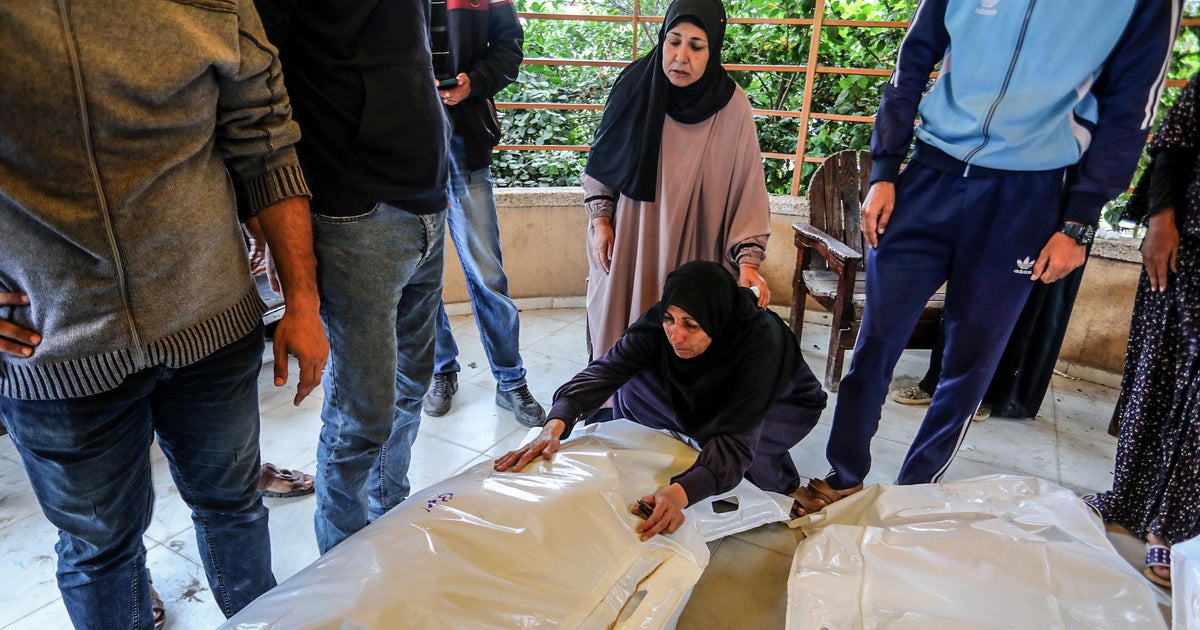As B-52 bombers arrive in region, defiant Iran says U.S. "will not dare" attack
The face-off between Iran and the United States continued to escalate on Friday as the Islamic Republic's elite Revolutionary Guards goaded the Trump administration with a dare, just a day after American B-52 bombers landed in the region. CBS News senior national defense correspondent David Martin said Thursday that all four B-52 Stratofortress bombers ordered to the Persian Gulf by the White House had arrived at the Al Udeid Air Base in Doha, Qatar.
The White House deployed the bombers to the Gulf, along with the USS Abraham Lincoln aircraft carrier and its associated vessels, over the weekend. While the Lincoln was deployed to replace a different U.S. carrier that was rotated out of the Gulf last month, there are few more irrefutable and visible demonstrations of U.S. military might than the deployment of a carrier strike group.
Iran has dismissed the bombers' presence and the looming arrival of the Lincoln as "psychological warfare" by Washington.
President Trump's national security adviser John Bolton has said the deployment was a warning to Iran after "escalatory indications" that Tehran was preparing to carry out a possible attack on U.S. forces or allies in the Middle East.
Iran claims it is Washington levelling the threats, and on Friday the Revolutionary Guards' deputy chief for political affairs said his country had ruled out any negotiations with the U.S., suggesting it couldn't take the Trump administration at its word.
"No talks will be held with the Americans and the Americans will not dare take military action against us," the Guards' Yadollah Javani said, according to Iran's state-controlled Tasnim news agency. He said Iran "sees America as unreliable."
A senior Iranian cleric, one of about 80 who currently sit on the government's Assembly of Experts, lashed out on Friday at the U.S. military posturing, suggesting that the entire U.S. Navy strike group could be destroyed with a single Iranian missile.
"Their billion (-dollar) fleet can be destroyed with one missile,'" Ayatollah Yousef Tabatabai-Nejad was quoted as saying by Iran's state-run ISNA news agency.
The anti-American rhetorical flourish was typical of Iran's senior clerics, who have significant influence in the country, but little real power. All final decisions in the country are made by the Supreme Leader, Ayatollah Ali Khamenei.
"Indications and warnings"
Bolton did not provide details on Sunday of the "troubling and escalatory indications and warnings" that Iran was plotting a possible attack, but said the Trump administration wanted to send a "clear and unmistakable" message that "unrelenting force" would meet any attack on U.S. interests or allies.
"The United States is not seeking war with the Iranian regime, but we are fully prepared to respond to any attack, whether by proxy, the Islamic Revolutionary Guard Corps, or regular Iranian forces," he said.
Martin said U.S. officials started noticing more "heated rhetoric" from Tehran in April, when the U.S. declared the Revolutionary Guards a terrorist organization, but it escalated after the Trump administration said it intended to bring Iranian oil exports down to zero by ending waivers that allowed a few countries to keep buying their petroleum products.
Officials told Martin that U.S. intelligence began picking up "chatter" about Iranian-backed Shiite Muslim militias in Iraq attacking Americans in the country, where there are still about 5,200 U.S. troops deployed.
On Friday, the U.S. Maritime Administration issued a fresh warning to commercial shipping companies, saying: "Reporting indicates heightened Iranian readiness to conduct offensive operations against U.S. forces and interests" in the Persian Gulf, the strategic Strait of Hormuz, and other regional waterways.
The advisory said that from the beginning of May, there was "an increased possibility that Iran and/or its regional proxies could take action against U.S. and partner interests, including oil production infrastructure, after recently threatening to close the Strait of Hormuz. Iran or its proxies could respond by targeting commercial vessels, including oil tankers, or U.S. military vessels in the Red Sea, Bab-el-Mandeb Strait, or the Persian Gulf."
Speaking to CBS News chief Washington correspondent Major Garratt for "The Takeout" podcast this week, White House chief of staff Mick Mulvaney noted the presence of U.S. troops, allies and assets in the region and made it clear they would be defended, but he added unequivocally: "We are not going to war with Iran."
How we got here
The antagonism between Iran and the U.S. has been ratcheting up steadily since President Trump took office. Even before he became president, Mr. Trump vowed to pull America out of the nuclear deal struck between his predecessor, President Barack Obama, Iran and other world powers.
Mr. Trump has always argued that the agreement, which saw Iran freeze its nuclear program in exchange for the lifting of international financial sanctions, was too generous to Tehran. The White House pulled the U.S. out of the agreement in May 2018, much to the consternation of not just Iran, but all of the other parties to the deal; China, France, Germany, Russia, the United Kingdom and the European Union.
Since then the White House has re-instated the U.S. sanctions that were lifted under the agreement, known as the Joint Comprehensive Plan of Action (JCPOA), and levied new, even harsher punishments against Iran.
Pointing at Iran's backing of militant groups in Syria and Iraq, and what the White House has said are continuing efforts to advance its ballistic missile program, the U.S. announced the decision last week to try and completely stop Iran earning any money from its energy exports by ending the waiver program noted above.
In reaction to the U.S. moves, Iran announced this week its own partial withdrawal from the nuclear pact, saying it will renege on some of the terms. Crucially, Tehran also warned that if Europe and the other remaining signatories cannot reach agreement within two months on a way to keep the nuclear deal -- or some new agreement -- viable, they will start enriching uranium to higher levels again.
That move would put Iran back on a short path toward the ability to build a nuclear weapon -- a prospect the JCPOA had extended by many years. Both Israel and the U.S. have made it clear that Iran will not be allowed to develop a nuclear weapons capacity.
European leaders said Thursday that they still backed the deal with Iran, but they rejected Tehran's threat.
"We reject any ultimatums and we will assess Iran's compliance on the basis of Iran's performance regarding its nuclear-related commitments" under a 2015 deal, the EU, Britain, France and Germany said in a joint statement issued Friday. The statement suggested an unwillingness by the European powers to stick their necks too far above the parapet for the sake of salvaging the nuclear deal, given the Trump administration's increasingly tough stance.





